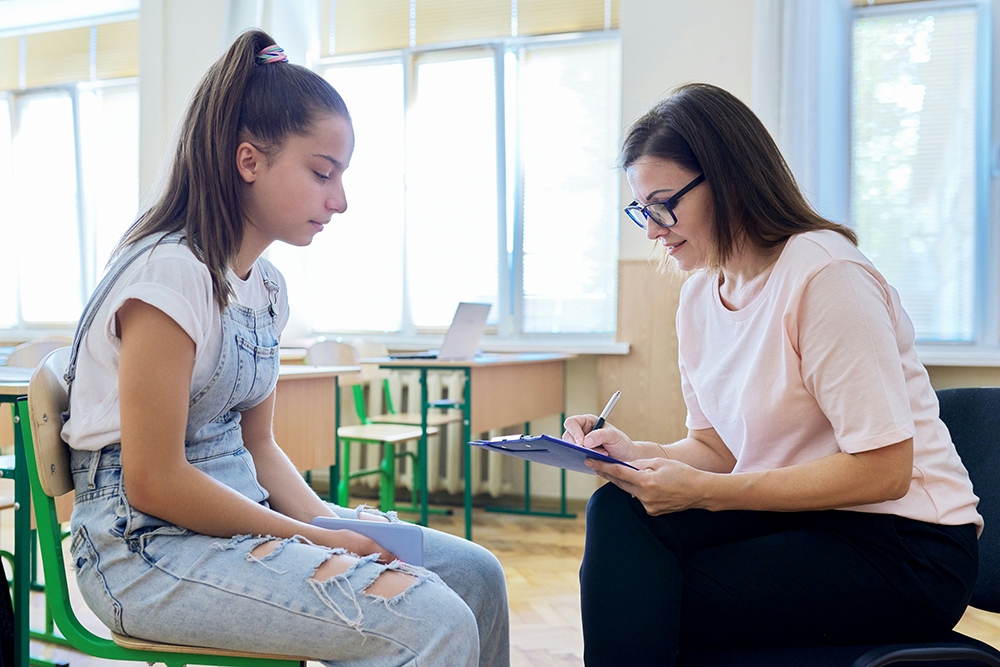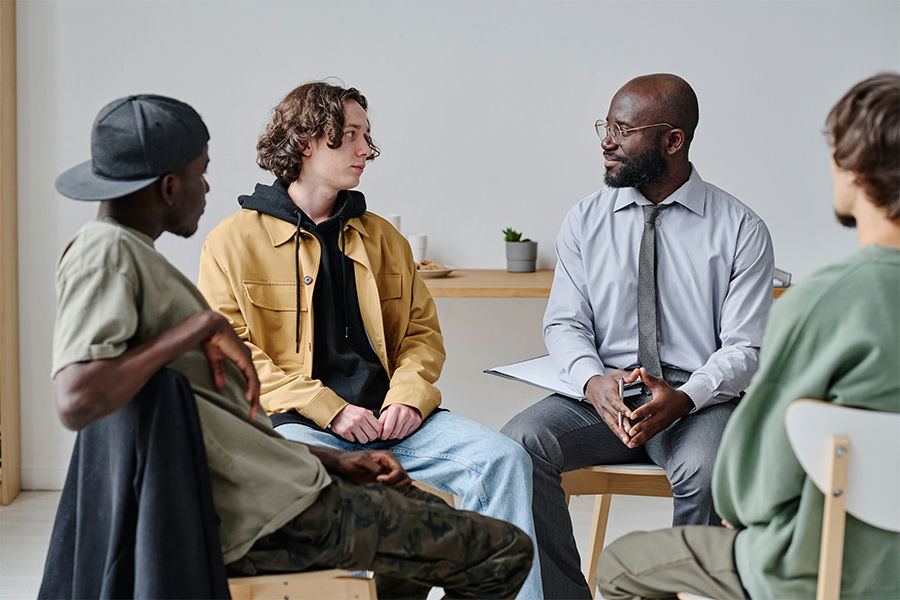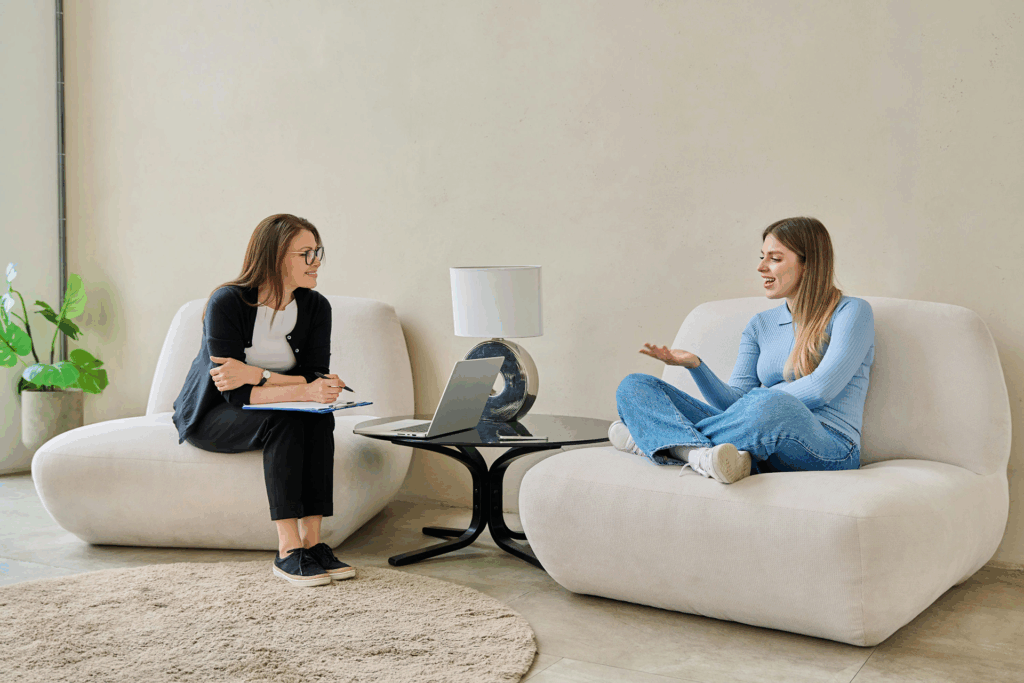The idea of your first therapy session might bring up all kinds of questions: Will it be awkward? Stumped on what to say? Many teens imagine therapy as an intense interrogation, but it’s just a chance to talk to someone who’s trained to listen without judgment. This session is about starting a conversation where you call the shots. At Ohio Center for Adolescent Wellness, our therapists understand that opening up takes time, especially when you’re meeting someone new, so there’s no pressure to have all the answers right away.
You’ll spend part of the session sharing what’s on your mind, but it’s not a one-way street. The therapist will likely ask about your life, your goals for therapy, and how you prefer to communicate. Some teens find it helpful to talk through specific problems, while others focus on general feelings they can’t quite name. However it unfolds, the first session is mostly about figuring out if you and the therapist click, because that connection makes all the difference in how helpful therapy will be. You’re not committing to anything permanent; you’re just testing the waters to see if it feels right for you.
Is Therapy Only For “Seriously” Troubled Teens?
Therapy isn’t just for crises; it’s for self-understanding, whether facing major mental health struggles or daily stress. It’s not an admission of catastrophe, but a check-in, like a physical. Many teens use it for confidence, school, emotions, or simply when something feels off. Therapy is most effective when it’s not a last resort; start early if you’re curious, regardless of how serious your problems are.
What Happens During Your First Therapy Session?

Your first therapy session might feel unfamiliar, but it’s mostly about getting comfortable and setting the stage for future conversations. Therapists know you’re not there to spill your life story instantly, so they’ll guide you without pressure. Here’s what typically happens, step by step:
- Paperwork and Basics. You’ll likely fill out some forms about privacy, rules, consent, and maybe a questionnaire about your mood or habits. This helps the therapist understand your needs.
- The “Getting to Know You” Talk. The therapist will ask general questions about what brought you in, your interests, and your life. You don’t have to share anything you’re not ready to.
- Setting the Tone. They’ll explain how therapy works, like how often you’ll meet or what their style is. This is your chance to ask questions, too.
- Light Exploration. They might gently ask about your feelings or struggles, but they won’t push you to dive deep right away. Think of it like testing the water before swimming.
- Wrapping Up. They’ll check how you’re feeling about the session and discuss next steps. If it felt awkward (it often does), that’s normal and gets easier.
What Symptoms Or Concerns Should Lead You To Therapy?
Therapy isn’t just for major meltdowns. A first therapy session could be beneficial if you’re consistently overwhelmed by emotions, whether it’s anger, sadness, or a lasting sense of numbness. Maybe your thoughts are always buzzing, making it tough to focus or sleep, or you feel disconnected from friends and family, like no one truly gets you. These are all good reasons to consider therapy, even if they don’t seem “serious” to others.
Our bodies often mirror our emotions. If you’re frequently battling headaches, stomachaches, or changes in how you eat or sleep that doctors can’t explain, therapy might help dig into why. Some teens also notice patterns they can’t break, like skipping school, ditching hobbies, or snapping at people over little things. You don’t have to be at your lowest to get something out of talking to someone.
Sometimes the signs are less obvious. Perhaps you overthink every chat, constantly second-guess yourself, or feel like you’re just drifting through life. Even if you can’t quite put your finger on what’s off, therapy offers a safe space to explore it. The sooner you tackle these things, the less control they’ll have over you. If you’re curious about therapy, that’s reason enough to check it out. There’s no need to wait until things become unbearable to reach out.
What Questions Will The Therapist Ask On Day One?
Your first therapy session will probably kick off with some easy questions to help your therapist understand what’s going on. They might ask why you’re there or what you’re hoping to get out of therapy. These aren’t trick questions; they’re just trying to figure out the best way to help you. You might hear stuff like, “What’s been bugging you lately?” or “How would you explain what you’re dealing with?”
Your therapist will want to chat about different parts of your life to get the full picture. They might ask about your sleep, energy, school, and friendships. They’re not looking for gossip, just trying to spot patterns or things that are stressing you out. Ever wondered what a typical day looks like for you, or who’s in your corner when you need support? These kinds of questions help your therapist get a clearer picture of your world.
You’ll probably chat about your past a bit, but only what you’re cool with sharing. They might ask about old struggles, family stuff, or when you first noticed what’s bringing you to therapy. Remember, you decide how much you open up. It’s fine to say, “I’m not ready to talk about that yet.” Your therapist is there to listen, not to push you. By the time the session wraps up, you should have a better idea of how therapy can help with what’s on your mind.
What Do You Need To Bring And Prepare For Your First Therapy Session?

Starting your first therapy session should be a breeze. Just remember to bring your insurance card, ID, and any clinic forms they sent you. A notebook is cool if you want one, but optional. Comfort is key for your outfit.
Mentally, think about what’s on your mind. Are there specific situations, patterns, or questions you want to talk about? No need to organize everything perfectly; your therapist will help you sort it out. Also, it’s handy to have your schedule, any meds you’re taking, and a bit about your family history ready.
Try to show up 10-15 minutes early just in case there’s any last-minute paperwork. Just show up as you are: there’s no “right” way to do it. Your therapist will guide you through everything.
How Do Therapists Decide On A Treatment Plan?
Your therapist creates a treatment plan by gathering information from your first session and ongoing meetings. They pay attention not just to your words, but also how you say them, looking for patterns in your emotions, behaviors, and thoughts. The approach they take depends on what you’re dealing with, your personality, and what you hope to get out of therapy.
In the beginning, your therapist figures out which methods will work best for you. Some people like clear, structured exercises, while others prefer open discussions that lead to deeper understanding. Your therapist will use techniques that have been shown to help others in similar situations, but they’ll always personalize them for you. They might even mix and match different strategies as you go along.
Ohio Center For Adolescent Wellness Supports Teen Mental Health

At Ohio Center for Adolescent Wellness (OHCAW), we offer cool outpatient mental health programs for teens aged 13-17. We mix proven methods with creative therapies like music therapy. We believe in catching issues like academic stress or anxiety early, knowing how much your brain is developing right now. We also believe that family involvement is important and that your family should be included, so we include meditation and academic support. Our goal at OHCAW is to make mental health care easily reachable by all, helping Ohio teens build strength and grow. Contact us today to begin an exciting new chapter in your life.
FAQs About Your First Therapy Visit
Q: What should I expect in my first session?
A: Your first therapy session is mostly about getting comfortable and sharing what brought you in. The therapist will ask questions to understand your situation, but won’t push you to talk about anything you’re not ready for. Think of it as a low-pressure conversation where you set the pace.
Q: Do I need to prepare anything?
A: No special prep is needed, just show up as you are. Some people find it helpful to jot down a few things they’d like to discuss, but it’s okay if you don’t have everything figured out. The therapist will guide you.
Q: Will they diagnose me right away?
A: Not necessarily. Diagnoses (if needed) usually come after a few sessions once the therapist has a clearer picture. The first visit is more about listening and building trust than labeling anything.
Q: What if I don’t like my therapist?
A: It’s normal to wonder if the fit is right. If something feels off after a session or two, you can discuss it with them or ask to switch providers. A good therapist will not take it as a personal affront.
Q: Is everything I say confidential?
A: Mostly, yes. Therapists keep your conversations private unless there’s a safety concern (like risk of harm to yourself or others). Your therapist will begin by outlining the boundaries of confidentiality.
Q: How do I know if therapy is working for me?
A: Progress isn’t always obvious right away. Small signs, like feeling heard, noticing patterns in your thoughts, or handling stress slightly better, can mean it’s helping. You and your therapist will regularly review your goals.
Q: Can I bring someone with me?
A: Some therapists allow a support person to join part of the first session, but individual time is usually needed, too. Ask the clinic beforehand about their policy.




